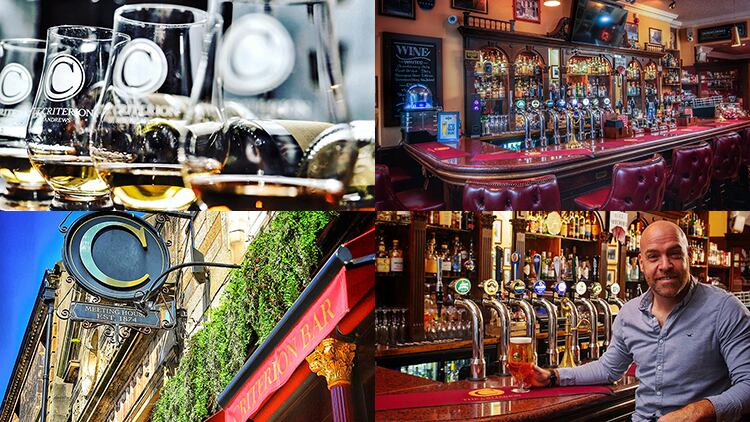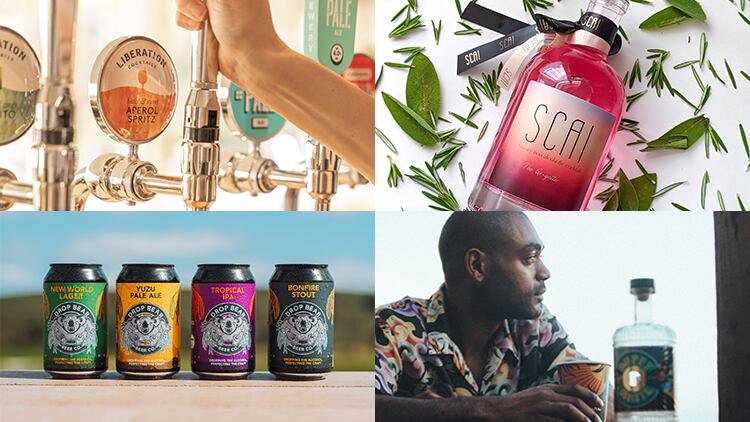According to Heineken UK, consumer sentiment research reveals 37% of people were planning to make their returning on-trade visits more special by choosing more premium drinks and food.
A fact Steve Latto, proprietor of the Criterion bar in St Andrews – former Great British Pub Awards Best for Spirits – also backs. He says: “Since opening back up from lockdown, the response has been very positive and we can definitely see an increase in customers premiumising their experience through trading up from normal serves across all product ranges, and there is also a willingness to try different things.”
Heineken UK on-trade category and commercial strategy director John Gemmell adds: “Premiumisation is driving the growth in on-trade revenue with consumers going out less but visiting more premium outlets and choosing more premium drinks with a higher price point. This trend shows no sign of slowing down and, if anything, has accelerated since reopening.
“The brands that saw the biggest uplifts during the reopening period were generally those on the more premium end of the scale – reinforcing this shift in consumer behaviour and the financial benefits to offering trade up options.”
Spirits offer a licensee the ideal opportunity to boost customer spend by encouraging moving on to a more expensive brand.
Becky Davies, head of commercial for drinks importer and distributor Ten Locks says: “Premium spirits offer a significant trade-up opportunity and a boost to profits at time when every sale counts and consumers are ready to spend.
“Pubs that offer something top quality and out of the ordinary will nurture those seeking more special experiences and establish venues as a destination.
“Stock brands that bring consumers up the price ladder with engaging back stories that enable bartenders to share why they command a higher price point. There’s an opportunity for lesser-known brands to step in here, as well as products produced sustainably, with an eye on the environment and their communities.”
Latto explains if a bar or pub wants to move its drinks offer into a premium one, there are a number of options available to them.
The Criterion bar specialises in cask ale and whisky, offering more than 160 whiskies and 70-plus Scottish gins.
He says: “A premium drinks offer needs to have four things – a wide taste profile, great presentation, well-trained staff and you must advertise it.
“Whether it is spirits, beers or wines, you need to offer a range of taste profiles to encourage the customer to trade up, to try something different from their standard drink.
“This doesn't have to mean you need to stock a massive range of products if you do not have the space. You just need to make sure the products you stock are not all similar in taste so, for example, we have just taken on some a tequila that is aged in a whisky barrel that adds a different dimension and makes it a sipping tequila, this also goes for mixers as well – offer a standard range and a premium range.”
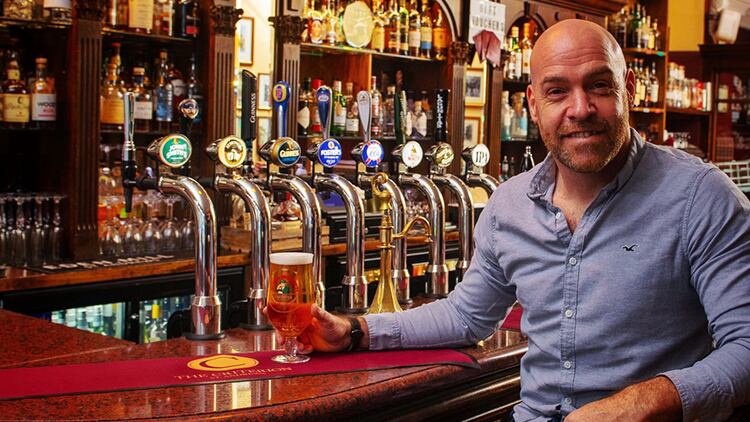
A glass act
Latto highlights how when it comes to presentation, if it looks appealing people are more likely to enjoy it. He recommends investing in glassware that show off the colours and garnishes and try to think about how to make each drink as Instagrammable but also quick and easy to make.
He suggests asking the brand owners of drinks you purchase to suggest which garnishes work best with their beverages and would “encourage operators to buy their own dehydrator so they can store lots of different dried fruits for garnishes so it minimises waste and helps your GP”.
“Your team needs to know what they are selling, what it tastes like and what goes well with it,” Latto says on the subject of staff training. “Engaging with brand owners to do tastings with our staff and customers enhances everyone’s experience.
“Any new product we get in, we get our staff to try it, it definitely helps upselling and lets them make better suggestions for customers when asked.
“Also if someone orders a gin and tonic, we don't just give them a house G&T we ask which gin they would like and what kind of tonic and then make recommendations Nine times out of 10, the customer will choose a premium gin and a premium tonic.”
Heineken UK’s Gemmell agrees that training of staff is a crucial cog in keeping the engine of successful premiumisation running smoothly. He says: “Excellently trained staff with correct beer and cider pouring practice will, ultimately, help you sell more great-quality pints, keeping customers happy and making your outlet more profitable.”
He also says training programmes such as Hello Beer can teach employees everything from cellar to glass care, as well as safety and hygiene.
On Latto’s fourth thing needed to create a premium drink offer – great advertising – the boss of the South Street site in Fife says: “If you have a new product or a new serve let your customers know via Instagram, Facebook, Snapchat, on your website and in-house promo materials.
“If they don’t know you have it, they probably won’t order it. One thing we have learnt from the restrictions is the importance of order-at-table apps. Not only does it allow the customer to place an order it gives them access to a full list of your products to browse through, so make sure you do not just have your products in alphabetical order, put your high margin products first on the list, you will be amazed by how much this drives sales towards these products.”
Premiumisation in the drinks world may well mean a greater yield from the same size serves but Heineken’s Gemmell says it is vital to retain standard lager offers, for example, to ensure a greater range is available to suit all pockets.
He says: “As a result of premiumisation, classic lager has dropped from 40% volume share in 2017 to 34% in 2021, while premium continental brands have grown from 8% to 15% in the same time period (source: CGA Strategy).
“The average price of a pint of beer is up 14% in the past four years, with a quarter of that increase solely down to consumers buying into more premium choices.
“Despite the price premium of trade-up options, it’s important not to remove classic brands altogether unless you run a super-premium outlet. You risk alienating loyal drinkers and that could be costly, especially given classic lager accounts for £1 in every £3 spent on draught beer.”
The same applies to cider, according to Gemmell. He says the average throughput of mainstream apple cider is almost double the rate of a premium apple option, while flavoured cider mainstream options out-deliver premium by almost two to one.
“Consumers are buying into more premium choices, with 20% of people saying that they will now pay for more premium drinks. Although most consumers know roughly what they’re looking for when entering a bar, about half have not yet decided on the exact brand. Offering at least one or two premium choices for every popular drink type in your outlet gives customers the chance to trade up if they wish, while earning you extra revenue.”
Latto gives an example of the type of product that will help push your drinks offer from still to sparkling. He says: “We always notice a spike in sales on certain products after one person has ordered one and it’s been walked through the bar.
“Aperol Spritz is a classic example of this because of its vibrant orange colour with orange slices in a stemmed glass as is Boe Violet Gin, which is purple in colour and served with blueberries in a fluted gin goblet – if it looks appealing, it will sell.”
Challenge to bartenders
Davies at Ten Locks recommends agave spirits to sites that want to establish a premium range because they command a high price.
She cites El Tequileño tequila as a brand that industry players have been trying to get their hands on for some time for good reason – especially the Blanco – because the blue agave plant from which it is made takes about seven years to mature.
This tequila can be used to make the Batanga cocktail, which also includes lime juice, salt, Mexican cola and ice.
Davies includes Banhez mezcal as another premium option and is a great choice for mezcal margaritas (mezcal, triple sec, lime juice, simple syrup, salt).
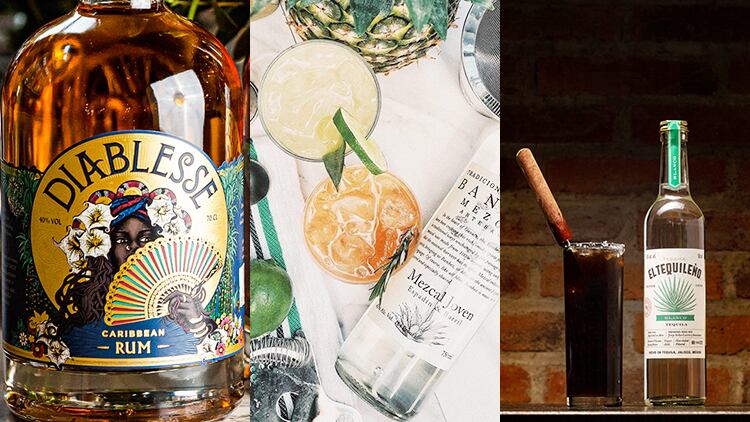
She says: “The challenge to bartenders is to show even more of their worth and create drinks that can’t be prepared at home; unusual garnishes, frozen drinks such as a daiquiri or margarita, or those more creatively presented. These impressive drinks, using upmarket brands, can certainly command a higher price.
“Escapism appears to be a growing trend too – drinks from far away that offer new flavour experiences appeal to those seeking a sense of adventure at a time when travel is still uncertain. This will continue over the next year or so as consumers trade up, treat themselves and try new things.
“Spirits has been a hotbed for innovation, so they are in prime position to give pubs and operators extra reasons to bring customers up the price ladder.”
Ten Locks states Nusa Caña rum, which draws on flavour profiles from the Spice Islands of Indonesia, and Diablesse Rum are two examples of such escapism.
It claims Diablesse Clementine Spiced Rum is the only variant of its kind in the world, therefore offering a premium value. It is said to work well by adding to fruity cocktails, spritzes, and with mixers, such as ginger ale.
On beer and cider serves, Heineken puts Birra Moretti, Amstel, Heineken and Old Mout as must-haves behind the bar.
It claims Birra Moretti has been the fastest growing brand over the past five years, driving 74% of premium continental lager growth. As well as being the best-selling premium continental lager, Birra Moretti commands a higher RSP of +8p per pint than the category average, meaning “more money in the till than other premium continental lager brands”.
Heineken also says Amstel remains the most valuable premium 4% beer on the market and has the highest rate of sale versus all other premium 4% lager brands. Gemmell says: “Adding a premium 4% lager to your range can result in around a 20% increase in total takings and encourage around one in four classic lager drinkers to switch brands and trade up. That equates to an extra 50p to 75p for every pint switched.
Meanwhile, the business also claims Heineken has the strongest rate of sale in the mainstream premium category and commands the highest price per pint – 13p more than its nearest competitor. It adds Heineken helps recruit younger drinkers into on-trade outlets because 50% of Heineken drinkers are aged between 18 and 35.
What’s more its Heineken Served Extra Cold option, with an eye-catching dual iced font, enhances visibility and helps boost revenues, with a 24% sales uplift compared to regular Heineken stockists.
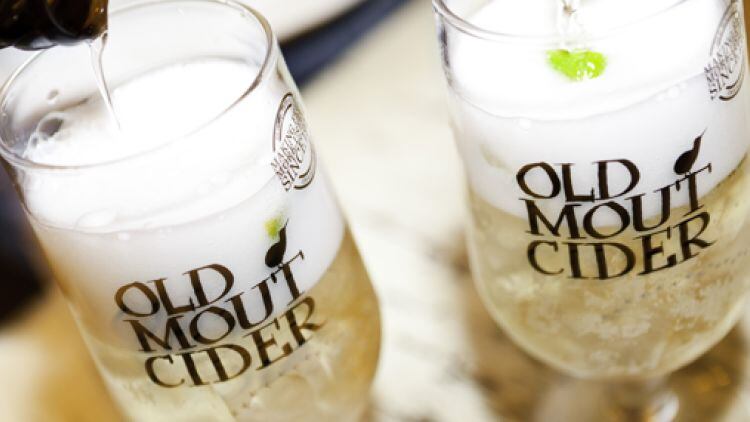
The company claims that, as the fastest-growing premium cider, Old Mout is leading the growth within premium flavoured cider, with a 44% volume rise and 42% lift in value share growth. Its Pineapple & Raspberry variant doubled distribution during 2020 and is now the second biggest seller in the on-trade, commanding a premium average price per pint of £4.87.
The Criterion’s Latto concludes: “The on-trade in the UK is famous around the world. Ask any tourist what is on their ‘things to do’ list when they come to the UK and going to the pub will be one of them.
“The atmosphere of our pubs and bars around the UK is unique and cannot be replicated at home but we should never take this for granted. The main atmosphere comes from positive engagement from staff, if your team are upbeat, welcoming, friendly, approachable, knowledgeable and engaging, the customer journey will, ultimately, be a positive one, our biggest assets are our team so keep investing and supporting them as much as possible.
“Without doubt, the past 18 months have been the most challenging I have ever experienced in trade, but one thing it has taught me is you need to innovate, you cannot stand still, the Criterion will continue to focus on its team and creating the best customer experience we can.”
• Perhaps you want to upgrade your food offer into a premium one. Click here to learn how two of the country’s top pub chefs – Charlotte Vincent at the Five Bells Inn, Cullompton, Devon and Steven Smith of the Freemasons at Wiswell in Lancashire – have done so at their venues.

